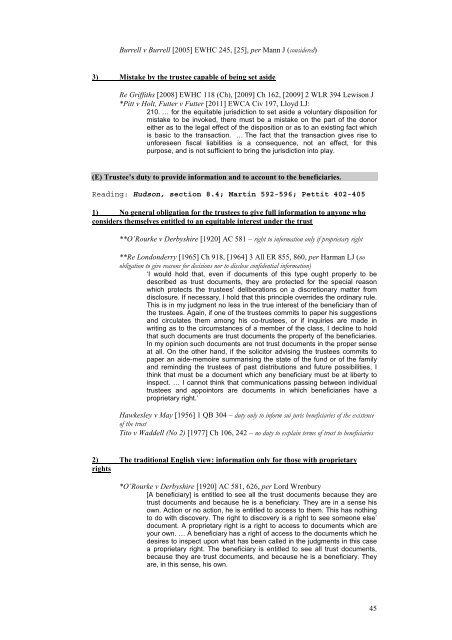Soton Equity and Trusts - alastairhudson.com
Soton Equity and Trusts - alastairhudson.com
Soton Equity and Trusts - alastairhudson.com
Create successful ePaper yourself
Turn your PDF publications into a flip-book with our unique Google optimized e-Paper software.
Burrell v Burrell [2005] EWHC 245, [25], per Mann J (considered)<br />
3) Mistake by the trustee capable of being set aside<br />
Re Griffiths [2008] EWHC 118 (Ch), [2009] Ch 162, [2009] 2 WLR 394 Lewison J<br />
*Pitt v Holt, Futter v Futter [2011] EWCA Civ 197, Lloyd LJ:<br />
210. … for the equitable jurisdiction to set aside a voluntary disposition for<br />
mistake to be invoked, there must be a mistake on the part of the donor<br />
either as to the legal effect of the disposition or as to an existing fact which<br />
is basic to the transaction. … The fact that the transaction gives rise to<br />
unforeseen fiscal liabilities is a consequence, not an effect, for this<br />
purpose, <strong>and</strong> is not sufficient to bring the jurisdiction into play.<br />
(E) Trustee’s duty to provide information <strong>and</strong> to account to the beneficiaries.<br />
Reading: Hudson, section 8.4; Martin 592-596; Pettit 402-405<br />
1) No general obligation for the trustees to give full information to anyone who<br />
considers themselves entitled to an equitable interest under the trust<br />
**O’Rourke v Derbyshire [1920] AC 581 – right to information only if proprietary right<br />
**Re Londonderry [1965] Ch 918, [1964] 3 All ER 855, 860, per Harman LJ (no<br />
obligation to give reasons for decisions nor to disclose confidential information)<br />
‘I would hold that, even if documents of this type ought properly to be<br />
described as trust documents, they are protected for the special reason<br />
which protects the trustees' deliberations on a discretionary matter from<br />
disclosure. If necessary, I hold that this principle overrides the ordinary rule.<br />
This is in my judgment no less in the true interest of the beneficiary than of<br />
the trustees. Again, if one of the trustees <strong>com</strong>mits to paper his suggestions<br />
<strong>and</strong> circulates them among his co-trustees, or if inquiries are made in<br />
writing as to the circumstances of a member of the class, I decline to hold<br />
that such documents are trust documents the property of the beneficiaries.<br />
In my opinion such documents are not trust documents in the proper sense<br />
at all. On the other h<strong>and</strong>, if the solicitor advising the trustees <strong>com</strong>mits to<br />
paper an aide-memoire summarising the state of the fund or of the family<br />
<strong>and</strong> reminding the trustees of past distributions <strong>and</strong> future possibilities, I<br />
think that must be a document which any beneficiary must be at liberty to<br />
inspect. … I cannot think that <strong>com</strong>munications passing between individual<br />
trustees <strong>and</strong> appointors are documents in which beneficiaries have a<br />
proprietary right.’<br />
Hawkesley v May [1956] 1 QB 304 – duty only to inform sui juris beneficiaries of the existence<br />
of the trust<br />
Tito v Waddell (No 2) [1977] Ch 106, 242 – no duty to explain terms of trust to beneficiaries<br />
2) The traditional English view: information only for those with proprietary<br />
rights<br />
*O’Rourke v Derbyshire [1920] AC 581, 626, per Lord Wrenbury<br />
[A beneficiary] is entitled to see all the trust documents because they are<br />
trust documents <strong>and</strong> because he is a beneficiary. They are in a sense his<br />
own. Action or no action, he is entitled to access to them. This has nothing<br />
to do with discovery. The right to discovery is a right to see someone else’<br />
document. A proprietary right is a right to access to documents which are<br />
your own. … A beneficiary has a right of access to the documents which he<br />
desires to inspect upon what has been called in the judgments in this case<br />
a proprietary right. The beneficiary is entitled to see all trust documents,<br />
because they are trust documents, <strong>and</strong> because he is a beneficiary. They<br />
are, in this sense, his own.<br />
45













